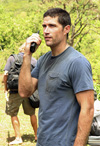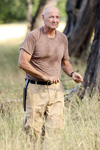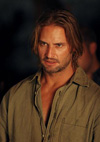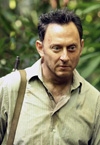The pop culture indulgence I’m most devoted to is LOST. For those of you who don’t know (do you exist?), LOST is an ABC prime time drama with a serial format. It piloted in 2004 and is currently in its fifth season. I caught up in ’06 and have been with it ever since.
It’s famously complex, multivalenced, sinister, and set in a lush and dramatic tropical setting (filmed in Oahu). Systems, physics, engineering, and a pleasing hybrid of magic and science play significant roles, lending the series its science fiction flavor (and what is its major classification as a literary genre? Good question, since it’s also a gothic romance, pulp fiction adventure, mystery, and ghost story). The series artfully blends dramatic formulas and psychologies into a kaleidoscope of character combinations and bizarre scenarios. I wonder if the writers know the ultimate outcome or not, and I know I’m mentally incapable of assessing, at the end, if all plot strands have been resolved.
The major characters are survivors of an airplane crash who have figured out how to exist on the island … sort of, since people regularly die, usually at the hand of male violence. But since the crash of Oceanic Flight 815 (and well before), all sorts of freaky shit has gone down on that island, the exact location of which is unknown, unknowable, and ever changing.
The island is a character frequently referred to as “wanting” things by the plane crash survivors and the other inhabitants of the island, conveniently called by the survivors, “The Others.” Only two of the Others are main characters, and one of these is the confoundingly manipulative Ben Linus, a leader of the Others and a descendent of the inhabitants and workers of the 60s-era Dharma Initiative, a mysterious set of experiments and research stations and a working community of scientists, menials, and their children. Dharma Initiative relics and stations lay in wait all over the island.
Lots of folks have been and are writing about this show, in books, articles, and blogs. The show attracts 11.3 million viewers currently, and is ranked 28th in the nation (while its share of viewers in the 18-49 demographic has been, and may still be, the highest in the country for the 10 pm time slot).
What has floated to the top for me in my tenure as a fan is the prominence of male leadership as a repeated theme, involving all major male characters. I’ll resist digressing into a rant about the small number of women characters, none of whom exercise leadership or spiritual agency—I hope that John Drabinski will chime in on the role of women in the show later in the week. The men, it must be said, are by far the most interesting and active. Here’s my list, which to my mind encompasses those men who regularly exercise power over others:
 Jack Shephard: A handsome 30-something doctor, originally on Oceanic 815 to bring his dead father back to the US from Australia. The character who most consistently has taken charge and accepted crushing responsibility for the well being of others; in part his natural authority comes from his profession and the fact that a doctor is crucial to the crash victims’ survival. Extremely hands-on and unable to let events transpire without being central to them. Father issues: his father was a doctor, his boss, actually, and an alcoholic who was fired because Jack reported his performing surgery while drunk. Jack’s father’s name is Christian—this is no accident.
Jack Shephard: A handsome 30-something doctor, originally on Oceanic 815 to bring his dead father back to the US from Australia. The character who most consistently has taken charge and accepted crushing responsibility for the well being of others; in part his natural authority comes from his profession and the fact that a doctor is crucial to the crash victims’ survival. Extremely hands-on and unable to let events transpire without being central to them. Father issues: his father was a doctor, his boss, actually, and an alcoholic who was fired because Jack reported his performing surgery while drunk. Jack’s father’s name is Christian—this is no accident.
 John Locke (the nod to the philosopher is likewise, no accident; the role is played by Terry O’Quinn, the one actor who had the job at the start of the project with a role written for him): John Locke is the character whose world view I root for the most consistently, for the basic reason that he’s the first character depicted as loving the island. He’s also the first to learn its geography. He is profoundly grateful to the island for having healed him: the plane crash restores his ability to walk. Equipped with hunting knives for an Australian “Walk About” adventure that he wasn’t permitted to join because of his wheelchair, he immediately trains himself to hunt and quickly becomes as crucial to the survival of the group as Jack. His ascent to authority begins with befriending and training the magical child Walt, the first (and for a long time, only) person with whom he shares the fact that he was paralyzed before arriving on the island. Father issues: oh, where to start. Locke grew up with adoptive parents and only learned about his biological father, who was a professional con man, as an adult, when his father befriended him to con him into donating his kidney—successfully–and immediately dropped him. When Locke confronts him, he pushes him out a window and the fall paralyzes Locke.
John Locke (the nod to the philosopher is likewise, no accident; the role is played by Terry O’Quinn, the one actor who had the job at the start of the project with a role written for him): John Locke is the character whose world view I root for the most consistently, for the basic reason that he’s the first character depicted as loving the island. He’s also the first to learn its geography. He is profoundly grateful to the island for having healed him: the plane crash restores his ability to walk. Equipped with hunting knives for an Australian “Walk About” adventure that he wasn’t permitted to join because of his wheelchair, he immediately trains himself to hunt and quickly becomes as crucial to the survival of the group as Jack. His ascent to authority begins with befriending and training the magical child Walt, the first (and for a long time, only) person with whom he shares the fact that he was paralyzed before arriving on the island. Father issues: oh, where to start. Locke grew up with adoptive parents and only learned about his biological father, who was a professional con man, as an adult, when his father befriended him to con him into donating his kidney—successfully–and immediately dropped him. When Locke confronts him, he pushes him out a window and the fall paralyzes Locke.
 James “Sawyer” Ford: Growing more likeable by the season, this romance-novel-cover-style rake with a Southern accent is another con man with an obviously self centered approach to survival at the beginning. Sawyer is the only character seen to rifle through the destroyed hull of the plane and stockpile goods (guns included), keeping them hidden and locked and using them for bargaining power later. He’s also a reader, and can be seen reading novels like Watership Down (that made me love him). His journey to Australia—the reason he was on Flight 815—was to seek and murder the guy whom he believed was responsible for his father’s suicide. But he got the wrong guy. So he starts off as a creep, always at odds with Jack, making changeable alliances with others, and in love with the same woman as Jack (this is perhaps his experience of grace). He evolves, and in the current season, he plays a pivotal leadership role, accepts and embraces responsibility for other people, and is explicitly exercising his own, considered brand of control. Father issues: Well, for starters he is the father of an infant, back in the States, that he has no intention of raising. His own father committed suicide, witnessed by Sawyer, after Sawyer’s mother lost all their money to a con man she was also having an affair with: John Locke’s father. Later on in Season 3, Sawyer kills Locke’s father on the island.
James “Sawyer” Ford: Growing more likeable by the season, this romance-novel-cover-style rake with a Southern accent is another con man with an obviously self centered approach to survival at the beginning. Sawyer is the only character seen to rifle through the destroyed hull of the plane and stockpile goods (guns included), keeping them hidden and locked and using them for bargaining power later. He’s also a reader, and can be seen reading novels like Watership Down (that made me love him). His journey to Australia—the reason he was on Flight 815—was to seek and murder the guy whom he believed was responsible for his father’s suicide. But he got the wrong guy. So he starts off as a creep, always at odds with Jack, making changeable alliances with others, and in love with the same woman as Jack (this is perhaps his experience of grace). He evolves, and in the current season, he plays a pivotal leadership role, accepts and embraces responsibility for other people, and is explicitly exercising his own, considered brand of control. Father issues: Well, for starters he is the father of an infant, back in the States, that he has no intention of raising. His own father committed suicide, witnessed by Sawyer, after Sawyer’s mother lost all their money to a con man she was also having an affair with: John Locke’s father. Later on in Season 3, Sawyer kills Locke’s father on the island.
 Ben Linus: A leader of the Others, a group that appears to be hostile to the interests of the crash survivors and, previously, members of the Dharma Initiative, where Ben was raised. Weirdly enmeshed in the lives of all the crash survivors, he is feared and reviled; only cooperated with when there appears to be no choice (a charismatic cult leader, forced psychological consent is his hallmark). Abused by his alcoholic janitor father, he defects to the Others and helps commit a mass murder of the members of the Dharma Initiative, who are then piled into a mass grave. Father issues: He murdered his father. And later he murders his daughter, whom he stole as an infant from a marooned French scientist. But we still wonder if he will be somehow redeemed, probably because some episodes have focused on his victimhood as a child.
Ben Linus: A leader of the Others, a group that appears to be hostile to the interests of the crash survivors and, previously, members of the Dharma Initiative, where Ben was raised. Weirdly enmeshed in the lives of all the crash survivors, he is feared and reviled; only cooperated with when there appears to be no choice (a charismatic cult leader, forced psychological consent is his hallmark). Abused by his alcoholic janitor father, he defects to the Others and helps commit a mass murder of the members of the Dharma Initiative, who are then piled into a mass grave. Father issues: He murdered his father. And later he murders his daughter, whom he stole as an infant from a marooned French scientist. But we still wonder if he will be somehow redeemed, probably because some episodes have focused on his victimhood as a child.
So, I ask myself in regards to this particular cluster of men, what exactly is going on here? Every one of them has a dead father that he, in a sense, has killed. The men fall short of marrying their mothers, but certainly they’re taking cues from Oedipus.
And Jesus. The island is deathless, characters are continually reborn or reinvented. Some characters (men) talk to the dead—or, rather, those we believed dead. Locke, who exercises the greatest degree of faith, thanks, and praise, experiences a literal rebirth in order to “save” people left on the island. Time travel and flashbacks constantly redirect the plot and raise the dead. One needs to die to reach the island at all, it seems. A common interpretation for the island is that it is an afterlife. Or is it God?
It has been posited that the God of LOST is a very Christian God—many details suggest that it’s a specifically Catholic God. And the men of LOST are a fallen group. This hugely popular program isn’t only about masculine leadership, it is entwined with a Christian spiritual mythos: truth seeking (with seemingly illuminating events often being misunderstood and understood differently later) and a quest for redemption. Those of us who are hooked crave understanding, and we’re also eager to find a leadership model that works. It’s clear to me that the community model is distrusted (another essay could be devoted to that theme)—individual men must emerge and shape events, although they must sacrifice their lives for others in order to achieve full power. Methinks it’s no wonder that this combination has millions of people all over the world enthralled.


